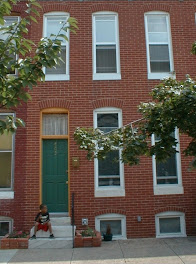By: Sunny Cooper, Special Projects Manager, NHS of Baltimore
More recently, there has been a plethora of articles and commentary as to the decline of homeownership and its decreased financial profitability to the end-Homebuyer. While buying a Home may not reap the huge financial rewards of a few years ago, it is still an investment.
Buying a home is an “Investment in You”
It’s your achievement.
It’s a testament that you did it (made a financial investment) – all by yourself…
You worked hard, saved, went to classes and got your credit in order.
That in itself is your accomplishment. This accomplishment is represented in something tangible – A home.
Buying a home is an “Investment in Your Community”
You made a commitment to invest in a particular neighborhood by buying a home.
You maintain this investment by:
- Cutting the grass,
- Planting fall bulbs for spring tulips,
- Petitioning for speed bumps on your street along with your neighbors,
- Checking in on an elderly neighbor.
These neighborly interactions create a sense of community thus increasing the value of your home.
Buying a home is an “Investment in - Your City”-
The city needs investors who are committed to its success in order for it to thrive.
Potholes are filled, parks are cleaned and school buildings are improved – in part on funding received from property taxes. A strong invested citizen base attracts new businesses that “want” to move to the area. It attracts retail opportunities such as grocery stores and movie theatres. Lastly it demands public services necessary for the health and welfare of all citizens alike.
Gone are the days that the purchase of a home was merely for a – “5 yr Investment Strategy”…
Gone are the days that a home was purchased to be used as “Bank” with which to withdraw equity to fund other jumpstarts…
Hopefully we are returning to the ole’ retro idea – Buying a Home in which to actually “Live”.
Thursday, September 30, 2010
Friday, September 10, 2010
Homeowners Insurance: What do you need to know?
By: Raevyn Jones, Marketing Coordinator, NHS of Baltimore
When it comes to buying a home, most people work very hard to purchase the home and everything in it. It can take many years to build up a home from scratch. People should keep in mind that like anything else in your life, your property is at risk to dangers that are beyond your control. This could potentially wipe out everything you have spent years working hard for. These are primary reasons why one should have homeowners insurance.
Homeowners insurance coverage can offer a peace of mind, and will enable you to pick up the pieces and recoup financial losses in the event that your home or belongings are damaged and destroyed. When taking out homeowners insurance, it is very important to ensure that you are providing yourself with sufficient coverage. The first step to getting homeowners insurance is to find out what your home is actually worth. In addition to estimating the worth of your home, there are other factors to be aware of when purchasing a home.
Shopping around for good insurance prices and coverage plans is imperative. Many insurers have been raising rates to make up for losses they suffered during the financial crises. Also, insurers are competing for new customers meaning some of them are cutting better deals for new policy holders than for existing ones. This is why when shopping around, it is important that you find an insurer who is loyal to you.
Another issue that homeowners run into is having too much insurance coverage. It is very common for policies to contain inflation –protection provisions that automatically increase your coverage amount. Usually that would be a good thing, but now that construction costs have fallen, not so much.
Homeowners should also be aware of their reputation when seeking homeowners insurance. The same way lenders check your credit score to find out what amount to charge you, insurers look to see what claims you have filed in the past. At times, insurance records can be full of errors. Checking your insurance records before you seek coverage is necessary.
When selecting a deductible, you should go with the highest deductible you can afford and use your savings to cover the cost of minor repairs. Filing a claim for every broken window or minor damage can increase your premiums by 10% to 15%. Increasing your deductible from $500 to $1000 can lower your annual premium as much as 25% according to the Insurance Information Institute.
One of the most important factors when it comes to homeowners insurance is the history of the house. Though it seems unfair, claims associated with the property before you buy it can result in you paying more than you usually would. You can get information on past claims by asking for a copy of the seller’s CLUE disclosure report. Although you may be able to negotiate with the seller, you are stuck with the history of the house you buy.
When it comes to buying a home, most people work very hard to purchase the home and everything in it. It can take many years to build up a home from scratch. People should keep in mind that like anything else in your life, your property is at risk to dangers that are beyond your control. This could potentially wipe out everything you have spent years working hard for. These are primary reasons why one should have homeowners insurance.
Homeowners insurance coverage can offer a peace of mind, and will enable you to pick up the pieces and recoup financial losses in the event that your home or belongings are damaged and destroyed. When taking out homeowners insurance, it is very important to ensure that you are providing yourself with sufficient coverage. The first step to getting homeowners insurance is to find out what your home is actually worth. In addition to estimating the worth of your home, there are other factors to be aware of when purchasing a home.
Shopping around for good insurance prices and coverage plans is imperative. Many insurers have been raising rates to make up for losses they suffered during the financial crises. Also, insurers are competing for new customers meaning some of them are cutting better deals for new policy holders than for existing ones. This is why when shopping around, it is important that you find an insurer who is loyal to you.
Another issue that homeowners run into is having too much insurance coverage. It is very common for policies to contain inflation –protection provisions that automatically increase your coverage amount. Usually that would be a good thing, but now that construction costs have fallen, not so much.
Homeowners should also be aware of their reputation when seeking homeowners insurance. The same way lenders check your credit score to find out what amount to charge you, insurers look to see what claims you have filed in the past. At times, insurance records can be full of errors. Checking your insurance records before you seek coverage is necessary.
When selecting a deductible, you should go with the highest deductible you can afford and use your savings to cover the cost of minor repairs. Filing a claim for every broken window or minor damage can increase your premiums by 10% to 15%. Increasing your deductible from $500 to $1000 can lower your annual premium as much as 25% according to the Insurance Information Institute.
One of the most important factors when it comes to homeowners insurance is the history of the house. Though it seems unfair, claims associated with the property before you buy it can result in you paying more than you usually would. You can get information on past claims by asking for a copy of the seller’s CLUE disclosure report. Although you may be able to negotiate with the seller, you are stuck with the history of the house you buy.
Subscribe to:
Posts (Atom)




+for+blog.jpg)
.jpg)
